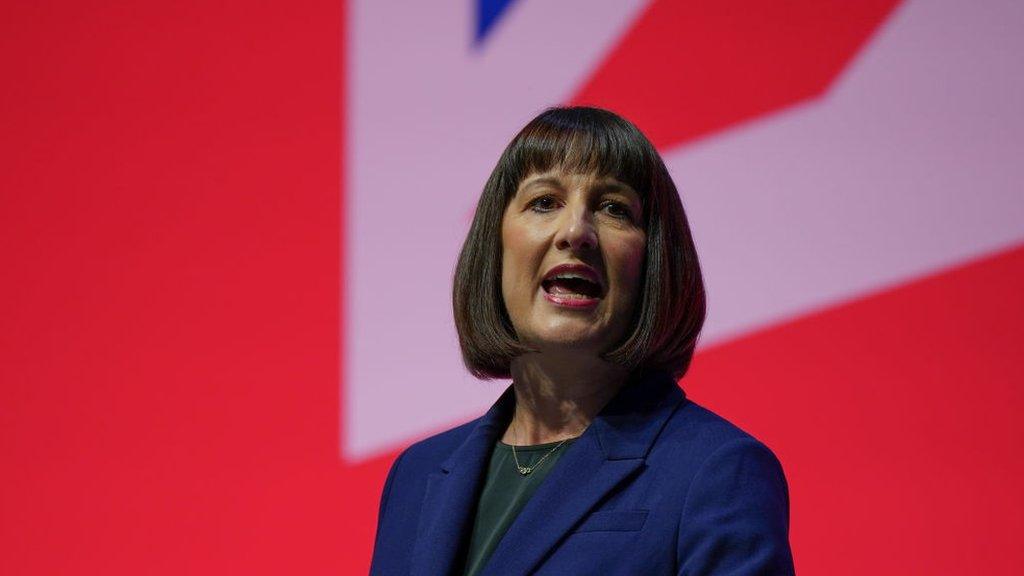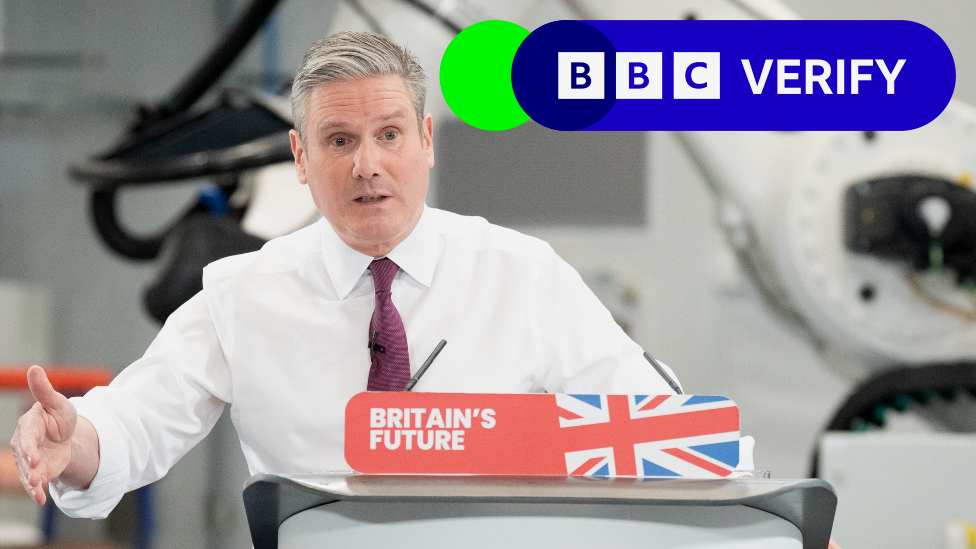Labour promise not to raise corporation tax if elected
- Published
- comments
Rachel Reeves says the “last thing we need is more chopping and changes” and stability is needed for businesses.
Labour has pledged not to increase corporation tax if elected, as part of a drive to win business support ahead of the general election.
Shadow chancellor Rachel Reeves said she would cap the tax at 25% but could cut it to boost "competitiveness".
Labour's pledge would provide "stability" to business, who have seen 26 changes to business taxes over the last parliament, she said.
Ms Reeves was speaking at Labour's day-long summit with business leaders.
In a keynote speech, the shadow chancellor said "investment has cratered" in the UK, due 14 years of economic instability under Conservative governments.
"I have heard time and time again from businesses that what they want is stability - including when it comes to tax," he said.
Corporation tax is a levy of all company profits. For firms with profits over £250,000, the top corporation tax rate is 25% - lower than the comparable rate US, Germany, France, and other G7 nations.
Smaller companies pay a sliding scale of corporation tax, down to 19% for companies that make a profit of £50,000 or less.
Ms Reeves sad the UK's top rate "strikes the correct balance between the needs of our public finances, and the demands of a competitive global economy."
Globally,140 countries agreed to impose global minimum corporate tax of 15% in 2021.
But she added Labour would be willing to cut the rate "should our competitiveness come under threat".
"That means businesses can plan investment projects today, with the confidence of knowing how their returns will be taxed for the rest of this decade," she added.
On Wednesday, Labour announced it would not reinstate a bankers' bonus cap that was scrapped last year by the Conservative government.
Ms Reeves said Labour would keep two more recent government announcements.
The party plans to keep full expensing, allowing companies to write off new investment costs, as announced by Chancellor Jeremy Hunt in the Autumn Statement., external The annual investment allowance announced by Mr Hunt, enabling companies to deduct some investments from taxable profits, will also remain in place.
If elected, Labour would also produce a "roadmap" for business taxation within six months of being elected to give companies certainty, said Ms Reeves.
'Party of business'
Her speech comes as the Labour leadership steps up efforts to win business support ahead of the general election.
Speaking to an audience of FTSE 100 chief executives and international investors, she said: "Be in no doubt, we will campaign as a pro-business party - and we will govern as a pro-business party."
Also speaking at the event, Labour leader Sir Keir Starmer said that if it wins power, the party plans to introduce its first wave of economic reforms without "too much legislation" so they don't get "bogged down".
In particular, he suggested he wanted to reduce ways to challenge new infrastructure projects through changes to planning guidance in England.
Among those at the Oval cricket ground venue, is Iceland's executive chairman Richard Walker, a former Conservative donor who this week switched to Labour.
Tickets for the event sold out in four hours, with hundreds said to be on the waiting list to attend.
On Thursday, Prime Minister Rishi Sunak hosted a panel with small business leaders in Downing Street.
The Conservatives have criticised Labour's business credentials - pointing out that the shadow cabinet contains no entrepreneurs - and accused the party of changing stance on economy.
Chief Secretary to the Treasury Laura Trott said: "Keir Starmer's record of making promises and then dropping them when they become inconvenient shows Labour will not provide businesses with the stability and certainty they need to invest."
Ms Reeves appeared to further water down her own 2021 pledge to spend £28bn a year on building a "green economy".
In June 2023, Ms Reeves said the £28bn would not be spent on day one of a Labour government because but would be the target for the second half of a Labour government.
Asked on Thursday, if Labour was still committed to the plans, Ms Reeves said: "All policies have to be consistent with our fiscal rules - the green prosperity plan is no exception".
She did not mention the £28bn figure specifically.
Labour's fiscal rules, external are to borrow only to invest and close the deficit on day-to-day spending make sure government debt is falling by the end the next parliament.
Related topics
- Published31 January 2024

- Published8 February 2024
